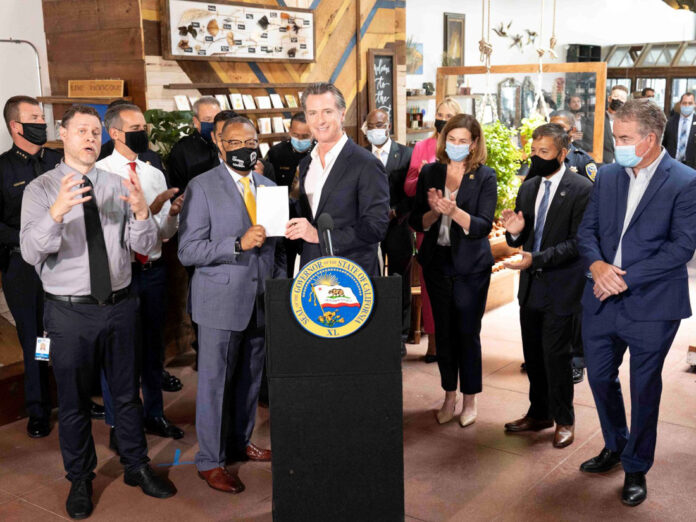
By Aldon Thomas Stiles, California Black Media
Gov. Gavin Newsom joined top law enforcement officials, state lawmakers and local officials in Los Angeles County on July 21 for a press conference to discuss rising violence and retail theft in California. “Among the most basic needs for all Californians is to feel safe at home, at the park or walking to school,” Newsom said. “As we pursue nation-leading criminal justice reforms – all with an eye to making our communities safer – a more holistic approach is called for. We must invest in public safety while, at the same time, tackling the root causes of these increases.”
Newsom also promoted his efforts to try to deter gun violence, including mental health services and after-school programs. “We need to see more accountability, we need to see enforcement and we need a commensurate commitment to address the reforms that I think many of us behind me embrace and have long embraced in California that have proven successful in this state,” Newsom said. At the press conference, Newsom signed Assembly Bill (AB) 331, which includes measures designed to crack down on organized retail theft by expanding the California Highway Patrol’s shoplifting task force.
According to Newsom, the task force conducted nearly 700 investigations which have led to 252 arrests and the recovery of $16.3 million in merchandise statewide since 2019. The signing of this bill occurs as incidences of organized retail theft are rising in California’s major metropolitan areas. Assemblymember Reggie Jones-Sawyer (D-Los Angeles), the author of AB 331 , spoke briefly about how it came about.
“We want to make sure we actually went after the organized retail theft felons who were victimizing not only the people that they got involved in this but also victimizing our businesses and retails,” he said. “This governor has also put in billions of dollars to make sure that those individuals can move into services such as drug rehab, education and employment so that they can permanently, permanently, get out of organized retail theft because that’s the ultimate goal here,” Jones-Sawyer continued.
Newsom acknowledged the growing public concern. “Bottom line, at the end of the day, as members of the public you expect us to resolve, to address these issues,” he said. “You expect all of us, regardless of your political stripes, regardless of geography, you expect all of us to respect you, you expect to feel some kind of connection to your community and you all expect, appropriately so, to be protected,” Newsom also said.
Some retailers and lawmakers believe that Proposition 47, a ballot measure California voters approved in 2014 that raised the minimum dollar amount for felony shoplifting from $450 to $950, is partially to blame for the spike in retail theft. The measure reclassified many of the state’s nonviolent offenses from felonies to misdemeanors. One critic is Sen. Melissa Melendez (R-Lake Elsinore) who suggested Newsom’s signing this bill was political theater to make up for Prop 47 and avoid a recall.
“In typical Newsom fashion, the Governor is patting himself on the back for attempting to fix a problem he not only breathlessly endorsed, but helped create,” tweeted Melendez on Wednesday, July 21. Newsom denies the current wave of retail theft issues is related to Prop 47, claiming that the measure is an “easy scapegoat” for people who are against criminal justice reform. “The evidence doesn’t back it up. The last three decades we’ve actually seen a significant decline in crime in the state. You’re seeing crime increase in red states that have no criminal reform,” Newsom told Fox News 11 in Los Angeles.
Newsom’s statement is backed up by U.S. Department of Justice data that concludes “laws and policies designed to deter crime by focusing mainly on increasing the severity of punishment are ineffective partly because criminals know little about the sanctions for specific crimes.” Newsom asserted that this has been a continual effort. He has led on policy efforts that have closed a number of California state prisons, halted the death penalty and eliminated cash bail for people who can’t afford it.
“This is not new in the state of California as the Assemblymember noted. We’ve been organized in a very deliberative manner to address the issue of organized retail crime for a number of years. We are doubling down on those efforts today with this bill that I’ll be signing here in a moment,” Newsom said. Newsom’s closing remarks attempted to strike the balance between accountability and mercy.
“We need to hold folks to account but we’ll do it in a thoughtful and judicious way, we’re not going back to the way things were in the 80s and 90s. At least not while I’m here,” Newsom said. “We’re not going to back out on our commitment to reform, at the same time, we’re not going to walk away from accountability either,” he concluded.
California Black Media’s coverage of the Governor’s Office public health efforts is supported by the California Health Care Foundation.


